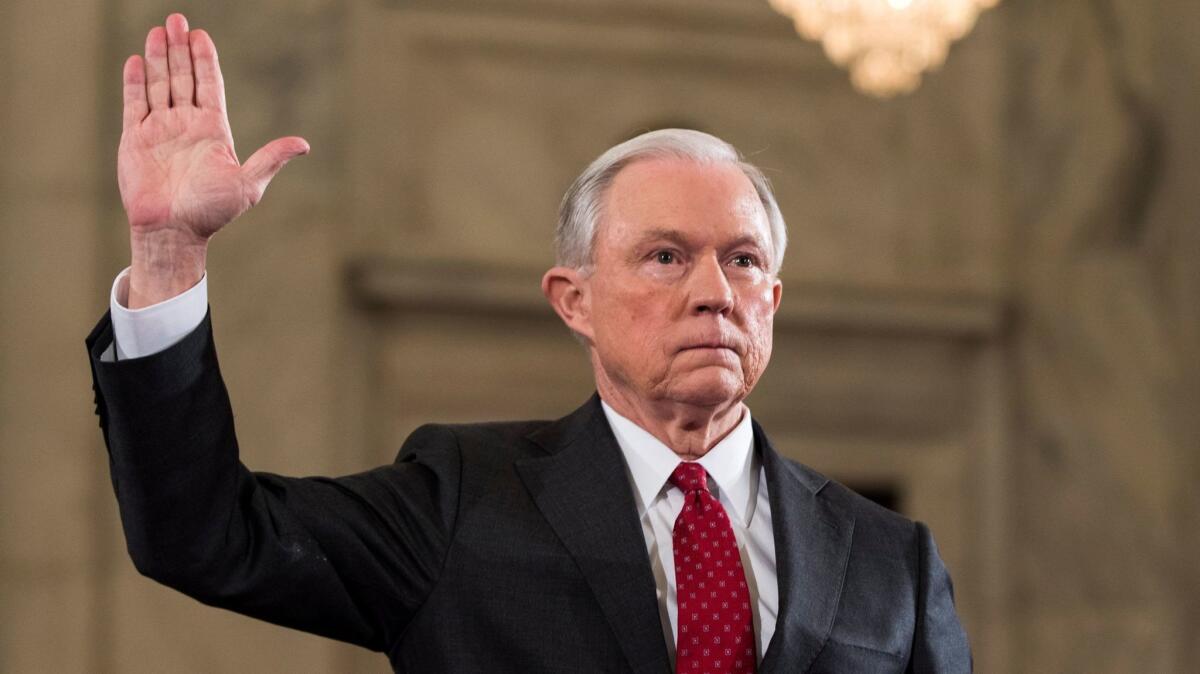Op-Ed: Can a leopard change his spots? Here’s hoping we don’t find out with Jeff Sessions

Many Republicans always insisted that their aspiration to Make America Great Again did not mean Make America White Again. Perhaps more are like Speaker Paul Ryan; six months ago Ryan called one of Donald Trump’s bigoted slurs “a textbook example of a racist comment,” but five months later found himself compelled to support the bilious billionaire; Ryan continues to both support the president-elect and maintain his own opposition to racism. If these claims are true, then Republicans have an opportunity to prove they reject bigotry: stand against the nomination of Jefferson B. Sessions for U.S. attorney general.
As he seeks to enter a Cabinet that will undoubtedly be the wealthiest in American history, Sessions seems among the most humble of the nominees. A faithful United Methodist in Alabama, as was George Wallace, Sessions is nothing if not a Southern gentleman. When Trump flew to Mobile on his pre-Christmas “thank you” tour, Sen. Sessions met him on the tarmac, accompanied by a welcome party of white Southern belles in hoop skirts. Anyone familiar with “Gone With the Wind” might imagine the greeting these fairest flowers of Alabama offered the two septuagenarian white men, aflame with their crusade to Make America Great Again.
But it was a black Southerner older than either of them who summed up the moral challenge that the Sessions nomination presents us. Quoting the prophet Jeremiah, the civil rights veteran from Alabama asked the simple question, “Can a leopard change its spots?” This is a question for the Senate and for the nation this week as we look toward the inauguration of Donald Trump.
To ask Jeff Sessions to take on this responsibility would be like hiring a blind bus driver.
Often conservatives insisted that they held their noses as Trump stoked racial fears and resentments on the campaign trail. Likewise, many white people — especially evangelicals and Catholics — expressed outrage that their embrace of a candidate endorsed by the Ku Klux Klan and spouting racial invective was somehow equated with racism. One generous analyst opined that many who voted for Trump were like the customer who only wants HBO but the cable company “bundles” HBO in the premier package with STARZ and Cinemax, which may or may not interest the customer; many who voted for Trump did so for reasons other than bigotry but were compelled to buy the whole bundle. The nomination of Sen. Sessions for attorney general is the moment we figure out who was buying what on Nov. 8.
When Ronald Reagan nominated a much younger Sessions for the federal bench in 1986, Congress had recently approved a national holiday to celebrate the legacy of Martin Luther King Jr. As a U.S. attorney in Alabama, Sessions had brought charges against Albert and Evelyn Turner, lieutenants of Dr. King who risked their lives for voting rights in Alabama. Sessions prosecuted Mr. and Mrs. Turner on voter fraud charges that could have resulted in a total of 250 years in prison. The evidence was flimsy; they were quickly acquitted of all charges.
This did not appeal to a nation celebrating the civil rights movement as a stride toward the more perfect union we had yearned to become. Sessions was infuriated. He told the Judiciary committee that he still believed he was right to bring the charges, but that he knew it was “clearly the spring board” for opposition to his nomination. “I am not a racist,” he insisted. “I am not insensitive to blacks.”
A quarter-century later, Sessions insists the same. And he is sincere. But he still doesn’t understand the basic definition of racism, a fault which, however understandable it may be in a white Southerner of his generation, must disqualify him for the position of chief law enforcement officer in a nation committed to equal protection under the law. This is a man who not long ago called the Voting Rights Act “a piece of intrusive legislation.”
Many important issues in Sessions’ record bear consideration, but voting rights betrayed his unrepentant racism a quarter-century ago and still do today. Since the 2013 Shelby County vs. Holder decision gutted the Voting Rights Act, Sen. Sessions has effectively blocked essential legislation to restore voting rights protections for 1,294 days longer than Sen. Strom Thurmond filibustered the 1957 Civil Rights Act. Instead, Sessions has championed voter suppression laws like the one we brought suit against in NC NAACP vs. McCrory. The federal court ruled in our favor, overturning that law. North Carolina’s voter suppression law “targets African Americans with almost surgical precision,” the court ruled. These are the laws Sessions celebrates.
Racism in America today does not require white supremacists that yell the N-word, wear robes, and burn crosses. Racism is perpetuated through systems of power that consistently privilege white people while discriminating against people of color and other minorities. One of the principal tasks of the U.S. attorney general is to challenge institutional racism at every level of American society. To ask Jeff Sessions to take on this responsibility would be like hiring a blind bus driver.
If Republicans believe Trumpism isn’t simply a whitelash against America’s first black president, this is their week to prove it. Surely many support Trump for reasons of their own, but Jeff Sessions does not have to be part of the package. Stop Jeff Sessions and confirm an attorney general who has demonstrated a commitment to the constitutional principle of equal protection under the law.
Rev. Dr. William J. Barber II is president and senior lecturer of Repairers of the Breach, pastor of Greenleaf Christian Church and architect of the “Moral Mondays” movement.
Follow the Opinion section on Twitter @latimesopinion or Facebook
More to Read
A cure for the common opinion
Get thought-provoking perspectives with our weekly newsletter.
You may occasionally receive promotional content from the Los Angeles Times.










